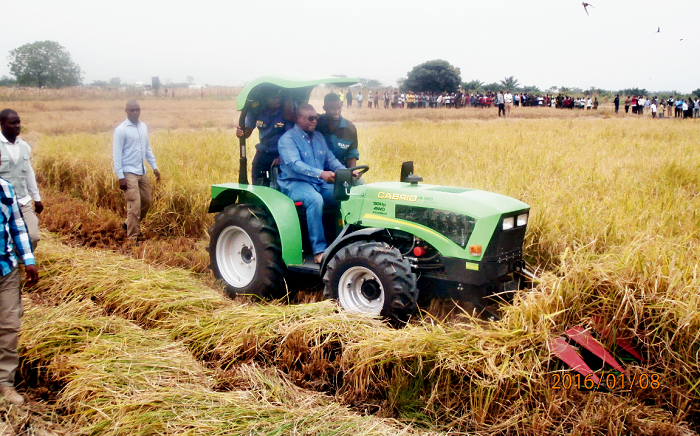
Farmers make inroads with new rice tractor to boost local rice production
Ghana's quest to reduce the importation of rice by increasing local production has begun to yield results.
Advertisement
The introduction and use of the CABRIO Compact Tractor, has brought much improvement in the operations of rice farmers in the country.
At a two-day workshop in Accra, organised by the Ministry of Food and Agriculture (MoFA), rice farmers at Akuse in the Eastern Region said the new rice tractor had drastically reduced the problem they encountered when growing local rice.
According to them, they have started to record massive improvements in the growing of rice using the new technology.
CABRIO Compact Tractor is a heavy duty frame built and tested for operations in rough terrains and rough conditions in African rice fields.
This new technology, manufactured in the Czech Republic, also has the capacity to allow the farmer to make better movement in wet and muddy areas of rice farms.
Already, MoFA has imported 250 units of CABRIO Compact Agricultural Tractors with multi-purpose accessories, including rotavators, mulchers, rice reapers and threshers for distribution to farmers in Ghana.
This initiative was taken by MoFA through the Agricultural Engineering Services Directorate (AESD) which is responsible for ensuring the availability of machinery/equipment and the adoption of other engineering interventions to Ghanaian farmers to enhance mechanised farming activities.
Mr Kofi Anane, one of the farmers who received the 50 HP CABRIO Compact Tractors and operates a 10-acre rice farm at Akuse in the Eastern Region, said the CABRIO Tractor had helped him tremendously in his farming activities so far.
“With the introduction of a new technology, rice farmers in Akuse and other parts of the country can now grow more rice within the shortest possible time,” he said.
Mohammed Iddrisu, another farmer who operates a 12-acre rice farm in Tamale, recounted the progress he had made with new Compact Tractor CABRIO.
“I used to worry so much during the rainy season because it becomes extremely difficult to work in the mud. The tractor has now made it possible to grow more and double my yields,” he said.
Rice production in Ghana
Ghana is said to import about US$ 600 million of rice annually.
The government has said it is poised to cut the rice import bill and make the country a net exporter by 2020.
When President John Mahama visited Scotland in March, this year, he told the Scottish parliamentarians that Ghana had increased its rice production from 30 to 60 per cent.
“We’ve taken rice from the production of 30 to 60 per cent as I speak, and so gradually we’re reducing rice import to Ghana,” he said.
Current production is said to hover around 290,000 tonnes, but according to the United States Department of Agriculture (USDA), in 2014 Ghanaians consumed a total of 754,698 tonnes of rice, with imports making up 52 per cent. Smuggling was not accounted for.
The USDA background note in January 2015 indicated that between October 2014 and September 2015, Ghana imported 600,000 tonnes of rice to augment the country’s needs.
A number of challenges stand in the way of the country’s ambitious attempt at reversing the over-importation of a commodity that has overtaken other traditional meals as a staple, especially in urban areas.
Govt strategic policies for rice
President Mahama, in his recent visit to Akuse in the Eastern Region to celebrate his third anniversary with rice farmers, described the new rice tractor as a major boost to local rice production in Ghana.
After he had driven the tractor to harvest rice, he said the new technology would make it much easier for rice farmers to increase their yield.
President Mahama added that apart from focusing on addressing bottlenecks along the rice value chain that had inhibited the growth of the rice industry, one of the strategies would be to equip the farmers with modern technologies to boost their production.
The strategy, he said, targeted the improvements in seed systems, fertiliser marketing and distribution system, harvesting access and maintenance system and research and technology dissemination.
Others include community mobilisation, farmer-based organisation and credit management system, as well as monitoring and evaluation.
President Mahama stated that since it was launched in 2010, it had been one of the documents guiding rice development in Ghana, as many areas identified in the strategy document were being applied by some stakeholders in their operations.
He said a number of interventions had been designed to focus on areas which include the rice sector support project, with emphasis on the development of water harvesting and regulatory structure supported by AFD; rice seed scaling project, supported by USAID and improvement and scaling up of the system of rice intensification in Ghana supported by World Bank.
President Mahama, therefore, urged rice farmers to improve on the quality of rice produced because Ghanaians have developed the taste for good rice.
Currently, only 60 per cent of rice consumed in Ghana is produced locally. It is the hope of President Mahama that by 2018, local consumption of rice will increase to a 100 per cent.
The Czech Republic government’s support
At the workshop, the Czech Republic Ambassador to Ghana, Mrs JUDr Margita Fuchova, expressed excitement at the level of bilateral cooperation between Ghana and the Czech Republic in terms of technological transfer in the area of agricultural mechanisation.
She said although rice was not produced in the Czech Republic, the country was trying its best to come out with innovation to help boost Ghana’s aim of producing rice locally.
Mrs Fuchova further urged Ghanaian operators to handle the CABRIO Compact Tractors properly in order for both countries to achieve their visions. She added that “this will strengthen the union already existing between Ghana and the Czech Republic.”
She also thanked MoFA, Ghana, for adopting their technology and promised to offer more assistance should they be called upon.



